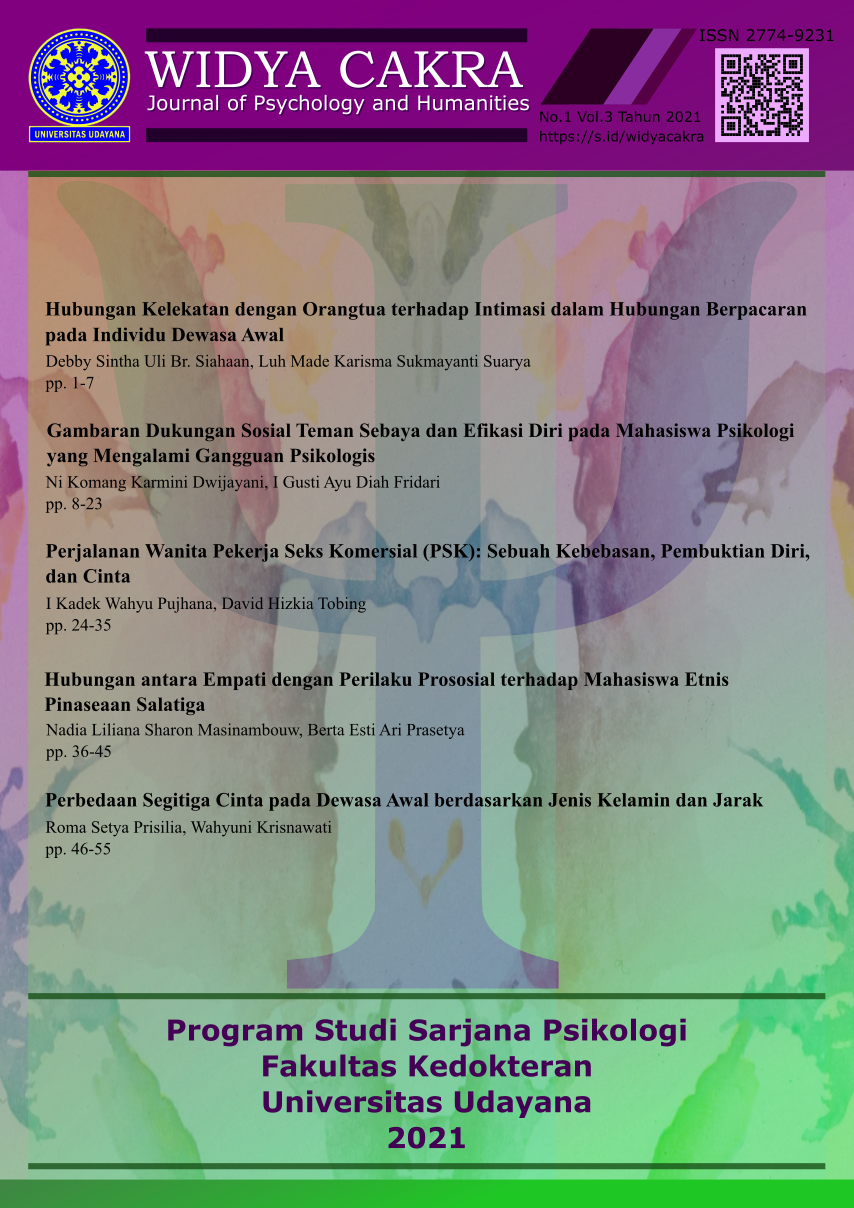Perjalanan Wanita Pekerja Seks Komersial (PSK): Sebuah Kebebasan, Pembuktian Diri, dan Cinta
Perjalanan Wanita Pekerja Seks Komersial (PSK): Sebuah Kebebasan, Pembuktian Diri, dan Cinta
Abstract
Working as a sex worker is a job that is in constant difficulty. The bad stigma in society, the social status that prohibits the existence of this work, to the legal, religious, and cultural social order in Indonesia also prohibits this work. Previous research has reported that earning money quickly is a major factor in maintaining and expanding the presence of prostitution locations in a number of settings. Apart from economic factors, a sex worker is actually someone who is the same as other people who also have emotional feelings when working. It is important then that there is a study that is able to describe the journey of sex workers to enter and survive in prostitution. This research is a phenomenological qualitative study, with semi-structured online and offline interviews, and observations on social media among five sex workers in Bali. The data were then analyzed by theoretical coding by Strauss & Corbin (1990). The results of the research show that working sex has provided freedom, a place to prove oneself, and find love. These three findings prove that prostitution is not only a sexual world to get money, but a sexual world to get the same emotional satisfaction. This study provides an understanding of the journey of sex workers, and their contribution to psychosocial aspects in the world of prostitution.
Downloads
References
Basuki, E., Wolffers, I., Deville, W., Erlaini, N., Luhpuri, D., Hargono, R., Maskuri, N., Suesen, N., & Beelen, N. van. (2002). Reasons for not using condoms among female sex workers in Indonesia. AIDS Education and Prevention; New York, 14(2), 102–116. http://dx.doi.org/10.1521/aeap.14.2.102.23901
Bellhouse, C., Crebbin, S., Fairley, C. K., & Bilardi, J. E. (2015). The Impact of Sex Work on Women’s Personal Romantic Relationships and the Mental Separation of Their Work and Personal Lives: A Mixed-Methods Study. PLoS ONE, 10(10). https://doi.org/10.1371/journal.pone.0141575
Carbonero, M. A., & Gómez Garrido, M. (2018). Being like your girlfriend: Authenticity and the shifting borders of intimacy in sex work. Sociology, 52(2), 384–399. https://doi.org/10.1177/0038038516688609
Cruz, K. (2018). Beyond Liberalism: Marxist Feminism, Migrant Sex Work, and Labour Unfreedom. Feminist Legal Studies, 26(1), 65–92. http://dx.doi.org/10.1007/s10691-018-9370-7
Hidayati, N., & Suhartini, D. E. (2013). Kekerasan pada pekerja seks komersial. Artikel Ilmiah Hasil Penelitian Mahasiswa Universitas Jember (UNEJ), 10.
Januraga, P. P., Gesesew, H. A., & Ward, P. R. (2020). Trust as a Determinant Factor for Condom Use among Female Sex Workers in Bali, Indonesia. Tropical Medicine and Infectious Disease, 5(3), 131. https://doi.org/10.3390/tropicalmed5030131
Januraga, P. P., Mooney-Somers, J., Gesesew, H. A., & Ward, P. R. (2020). The Logic of Condom Use in Female Sex Workers in Bali, Indonesia. International Journal of Environmental Research and Public Health, 17(5), 1627. https://doi.org/10.3390/ijerph17051627
Järvinen, M., & Henriksen, T. D. (2018). Controlling intimacy: Sexual scripts among men and women in prostitution. Current Sociology, 001139211881594. https://doi.org/10.1177/0011392118815945
Jeffreys, S. (1997). The Idea of Prostitution (1st ed.). Spinifex Press.
Jewkes, R., Morrell, R., Sikweyiya, Y., Dunkle, K., & Penn-Kekana, L. (2012). Transactional relationships and sex with a woman in prostitution: Prevalence and patterns in a representative sample of South African men. BMC Public Health, 12, 325. http://dx.doi.org/10.1186/1471-2458-12-325
Khumaerah, N. (2017). Patologi sosial pekerja seks komersial (PSK) perspektif Al-qur an. Junal Al-Khitabah, 3(1), 62–73.
Koentjoro. (2004). On the spot: Tutur dari sarang pelacur. Tinta : Didistribusikan oleh Qalam Yogyakarta. http://books.google.com/books?id=Ag_aAAAAMAAJ
Kurnianingrum, T. P. (2019). Politik Hukum Terhadap Tindak Pidana Prostitusi. Pusat Penelitian Badan Keahlian DPR RI, 11(1), 6. http://puslit.dpr.go.id
Magnani, R., Riono, P., Nurhayati, Saputro, E., Mustikawati, D., Anartati, A., Prabawanti, C., Majid, N., & Morineau, G. (2010). Sexual risk behaviours, HIV and other sexually transmitted infections among female sex workers in Indonesia. Sexually Transmitted Infections; London, 86(5), 393. http://dx.doi.org/10.1136/sti.2009.038059
Matahari, R. (2012). Studi kualitatif mengenai persepsi dan perilaku seksual wanita pekerja seks komersial (PSK) dalam upaya pencegahan IMS di Kota Semarang tahun 2012. Jurnal Kesehatan Reproduksi, 3(3), 113–123.
Munawaroh, S. (2015). Pekerja Seks Komersial (PSK) di Wilayah Prambanan, Kabupaten Klaten, Jawa Tengah. DIMENSIA: Jurnal Kajian Sosiologi, 4(2). https://doi.org/10.21831/dimensia.v4i2.3433
Purwaningtyastuti, P., & Savitri, D. (2017). Kebermaknaan Hidup Pekerja Seks Komersial Ditinjau Dari Konsep Diri. Jurnal Dinamika Sosial Budaya, 18(2), 260. https://doi.org/10.26623/jdsb.v18i2.575
Ridlwan, M. (2015). Resiliensi berbasis religi bagi mantan PSK dan mucikari pasca penutupan lokalisasi Gandul Tuban. Maraji: Jurnal Ilmu Keislaman, 2(1), 1–23. https://doi.org/10.36835/maraji.v2i1.35
Robertson, A. M., Syvertsen, J. L., Amaro, H., Martinez, G., Rangel, M. G., Patterson, T. L., & Strathdee, S. A. (2014). Can’t buy my love: A typology of female sex workers’ commercial relationships in the Mexico–U.S. Border Region. The Journal of Sex Research, 51(6), 711–720. https://doi.org/10.1080/00224499.2012.757283
Rusyidi, B., & Nurwati, N. (2018). Penanganan pekerja seks komersial di Indonesia. Prosiding Penelitian dan Pengabdian kepada Masyarakat, 5(3), 303–313. https://doi.org/10.24198/jppm.v5i3.20579
Siegel, J. (1990). Money and Marriage: A Transparency to the Struggles of Intimacy. Journal of Independent Social Work, 4(4), 51–60. https://doi.org/10.1300/J283v04n04_05
Strauss, A., & Corbin, J. M. (1990). Basics of qualitative research: Grounded theory procedures and techniques (p. 270). Sage Publications, Inc.
Tuohy, D., Cooney, A., Dowling, M., Murphy, K., & Sixsmith, J. (2013). An overview of interpretive phenomenology as a research methodology. Nurse Researcher (through 2013); London, 20(6), 17–20. https://search.proquest.com/docview/1406196683/abstract/8581D0CB704A4F06PQ/1
Vuolajärvi, N. (2019). Precarious intimacies – Europeanised border regime and migrant sex work. Journal of Ethnic and Migration Studies, 45(7), 1090–1107. https://doi.org/10.1080/1369183X.2018.1430558
Wahyuni, H. (2014). PSK dan tekanan sosial pasca penutupan Gang Dolly Surabaya. Personifikasi, 5(1), 1–18. https://doi.org/10.21107/personifikasi.v5i1.6567
Warr, D. J., & Pyett, P. M. (1999). Difficult relations: Sex work, love and intimacy. Sociology of Health & Illness, 21(3), 290–309. https://doi.org/10.1111/1467-9566.00157

This work is licensed under a Creative Commons Attribution-NonCommercial 4.0 International License.









